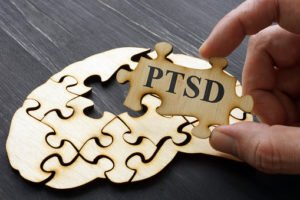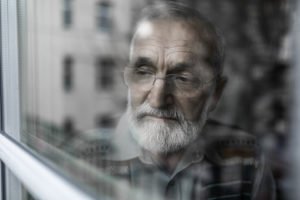
PTSD, or post-traumatic stress disorder, is a condition some people experience after extremely traumatic events.
The term “PTSD” first appeared in the American Psychiatric Association’s third edition of the Diagnostic and Statistical Manual of Mental Disorders in 1980. It has since become a household word.
At the time, it was used to replace outdated terms like “shell shock,” “combat fatigue,” and “soldier’s heart.” These terms were associated with the aftermath experienced by service members who witnessed traumatic events on the front lines of war.
Symptoms of PTSD
The four distinguishing symptoms of PTSD are:
- Intrusion: When negative thoughts, flashbacks, or memories about the traumatic event interrupt your flow of thought and affect your well-being
- Avoidance: Fearing and avoiding places, people, and things that remind you of the traumatic event
- Negative mood: Experiencing negative thoughts about yourself or others and feeling detached from others
- Hyperarousal: Acting aggressively and recklessly, as well as startling when confronted with thoughts or triggers of the traumatic event
PTSD Is Not Just for War-Scarred Veterans
Post-traumatic stress disorder is not just something veterans experience. Anyone who has lived through or witnessed a life-altering event can get PTSD. Events such as natural disasters, serious accidents, violations of body or home, or terrorist attacks can stir up PTSD.
People with PTSD relive the traumatic event through intrusive memories, flashbacks, disturbing thoughts, and nightmares. They will avoid anything that reminds themselves of the trauma. The anxiety brought on is so intense that it disrupts their lives.
PTSD and COVID-19
PTSD has been documented following recent epidemics. So, with the global pandemic literally affecting everyone on the planet–and taking the lives of 3.8 million people worldwide with it–it is no surprise that psychologists believe there will be serious aftereffects.
These consequences could lead to a mental health crisis.

One study by Chinese researchers who poled patients after being discharged and then quarantined following hospitalization from COVID-19 found that 96.2 percent of patients were experiencing signs of PTSD.
Another study performed in Italy that tracked 381 patients who had recovered from COVID-19 revealed that 30 percent of patients developed PTSD. (A similar percentage of patients–31 percent–were affected by PTSD following the SARS epidemic in the early 2000s in Toronto.)
Most of the Italian patients in the study had been hospitalized during their illness (81 percent). Other mental illnesses that developed in these patients post hospitalization were depression (17 percent) and generalized anxiety disorder, or GAD (7 percent).
Factors That May Contribute to COVID-19 PTSD
What’s unique about the pandemic is that it is long-running and ongoing. Studies so far have been limited to small sample sizes, so not much data are available on lingering mental effects.
Still, stressors have been identified that can contribute to trauma after the event. Such stressors include:
- witnessing a death, including the death of a loved one
- hospitalization
- severe illness
- extreme exposure to COVID-19 (such as by working in a hospital or nursing home)
- a fear of dying
- social isolation from being quarantined
- anxiety over the thought of getting sick again
- guilt over infecting others
PTSD Is Treatable
Fortunately for all of us, PTSD is a treatable disorder. Medication and psychotherapy, which have proven useful in PTSD in the past, should be of help following the COVID-19 crisis.
The following medications can help with PTSD:
- Antidepressants: These drugs, particularly selective serotonin reuptake inhibitors (SSRIs), like Paxil and Zoloft, can help with depression and anxiety to improve sleep and concentration.
- Antianxiety medications: These typically short-term drugs can help take away severe anxiety symptoms.
- Prazosin: Some people have benefited from this drug to reduce or take away nightmares.
Psychotherapy methods that help with PTSD include:
- Exposure therapy: By teaching people to reenter the setting that triggers PTSD symptoms, this behavioral therapy helps people safely face situations and memories that frighten them so they are able to safely cope.
- Cognitive behavioral therapy (CBT): This is talk therapy that teaches people to put aside negative thinking patterns. It often is used along with exposure therapy.
- Eye movement desensitization and reprocessing (EMDR): This technique combines exposure therapy with guided eye movements in order to process traumatic memories and reduce negative reactions.
There Is Help Available
It is likely that everyone will experience repercussions from the COVID-19 pandemic. And with more studies and data available, we all will learn to handle the fallout in a healthy way.
If you’re having difficulty coping right now, however, you may reach out to the following resources:
- 2-1-1 San Diego: Dial 211 or visit the website for community resource information on all aspects of assistance, including food resources, help with paying for utilities, housing, childcare, and health care, including mental health care.
- Access and Crisis Line: 888-724-7240; This free 24-hour-a-day, 7-day-a-week confidential crisis line is here to help people and their families struggling with depression, anxiety, anger, and fear. Live chat is available Monday–Friday, 4 pm–10 pm.
- NAMI San Diego Helpline: 619-543-1434; this helpline is staffed by trained volunteers and peer and family support specialists. Visit the helpline website.
- National Crisis Text Line: 741741; sometimes it’s hard to verbalize your feelings but it’s easier to text. This text line offers free, confidential, round-the-clock resources with a counselor.
- SAMHSA Disaster Distress Helpline: call or text 800-985-5990; this always-open helpline is there for people dealing with the aftermath of disasters, including COVID-19.
- Teen Line: Text “TEEN” to 839863 or call 800-TLC-TEEN from 6 pm to 10 pm to connect with a trained volunteer.
- The Warmline: 619-295-1055 or 800-930-WARM (7276); peer support specialists are available from 3:30 pm–11 pm, seven days a week for people who are feeling anxious, panicked, or depressed, or just need someone to talk to.
Herrick Library Resources
The following resources on post-traumatic stress disorder are available from Herrick Library to be checked out in person, through curbside pickup, or as an electronic book, where indicated:
- The End of Mental Illness: How Neuroscience Is Transforming Psychiatry and Helping Prevent or Reverse Mood and Anxiety Disorders, ADHD, Addictions, PTSD, Psychosis, Personality Disorders, and More, by Daniel Amen

- Leave No Trace (DVD; a moving drama about a father struggling with PTSD who lives with his teen daughter in an urban nature reserve because he is having trouble coping in society)
- Marathon: The Patriots Day Bombing (DVD; an intriguing documentary that follows the lives of several survivors of the 2013 Boston Marathon bombing)
- *Overcoming Avoidance Workbook: Breaking the Cycle of Isolation and Avoidant Behaviors to Reclaim Your Life from Anxiety, Depression, or PTSD, Daniel Gros
- The PTSD Workbook: Simple, Effective Techniques for Overcoming Traumatic Stress Symptoms, by Mary Beth Williams

- What Happened to You?: Conversations on Trauma, Resilience, and Healing, by Bruce D. Perry and Oprah Winfrey
Sources: American Psychiatric Association (APA), Post-Traumatic Stress Disorder, https://www.apa.org/topics/ptsd/index; APA, What Is Posttraumatic Stress Disorder?, https://www.psychiatry.org/patients-families/ptsd/what-is-ptsd; Anxiety and Depression Association of America, Symptoms Post-Traumatic Stress Disorder (PTSD), https://adaa.org/understanding-anxiety/posttraumatic-stress-disorder-ptsd/symptoms; Hartford Healthcare, PTSD from COVID-19? Here Are Four Signs, https://hartfordhealthcare.org/about-us/news-press/news-detail?articleId=28679&publicid=469; JAMA Psychiatry, Posttraumatic Stress Disorder in Patients After Severe COVID-19 Infection, https://jamanetwork.com/journals/jamapsychiatry/fullarticle/2776722; MedPageToday, One-Third of COVID Survivors May Have PTSD, https://www.medpagetoday.com/infectiousdisease/covid19/91255; Psychiatric Times, Post-COVID Stress Disorder: Another Emerging Consequence of the Global Pandemic, https://www.psychiatrictimes.com/view/post-covid-stress-disorder-emerging-consequence-global-pandemic; U.S. National Library of Medicine, From Shell Shock and War Neurosis to Posttraumatic Stress Disorder: A History of Psychotraumatology, https://www.ncbi.nlm.nih.gov/pmc/articles/PMC3181586/#:~:text=The%20term%20posttraumatic%20stress%20disorder,is%20associated%20with%20the%20legacy
Graphics: iStockphoto

